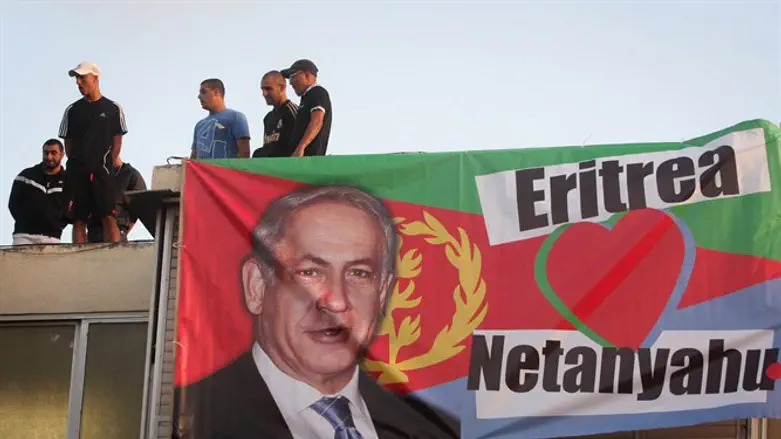
Angry responses were heard to the Supreme Court's ruling that it is no longer possible to detain infiltrators who refuse deportation to a third country, while Prime Minister Netanyahu discusses new legislation to enforce deportations.
“We will have to introduce an amendment to implement these agreements,” Netanyahu said, referring to a three-pronged illegal immigration strategy that consists of a wall protecting the southern border, agreements with African countries to absorb migrants, and law enforcement.
Justice Minister Ayelet Shaked announced plans to introduce legislation allowing Israel to deport infiltrators to other African nations “even without their consent.”
“We will fight this war until we reach the necessary results,” said Shaked.
A senior political source told Arutz Sheva that "the High Court is tying the state's hands [and preventing it] from acting to remove the infiltrators."
"The High Court's national conduct is irresponsible. Don't be surprised when a decision to increase migrant quotas is handed down," the source said.
Interior Minister Aryeh Deri said that "the decision not to allow the state to expel infiltrators against their will is very problematic, and it takes a very important tool away from the state allowing any infiltrator who wants to stay to remain in Israel."
He said that the possibility of using legislative amendments is being considered."I spoke immediately after the High Court ruling with Justice Minister Ayelet Shaked, and I told her that I intend to consider an amendment to the law that will allow the state to remove infiltrators from the country against their will.We have to take care of the citizens of the State of Israel, the residents of South Tel Aviv, and other cities whose lives are unlivable, I am satisfied that the High Court has authorized us to continue to remove infiltrators to a third country and we will continue to do so by all means at our disposal."
Minister Gilad Erdan said, "I am sorry but the High Court of Justice decision negates my decision as Interior Minister to implement the policy of expulsion to a third country, leaving the country bereft of an effective tool to remove the infiltrators."
The chairman of Ha'ir Haivrit Association against illegal infiltrators, May Golan, said that "again in a sophisticated way, the High Court succeeded in throwing sand in the gears of Israel's policy circles to send the infiltrators back.The High Court justices, acting like a branch of the Meretz party, knew full well that they would not be able to avoid approving this procedure and therefore approved it with an underhanded method.
"Two years since the Supreme Court judges have been leading the citizens of the State of Israel on, already knowing what the decision will be but not advertising it so as to buy time for the infiltrators and their collaborators from the Left.The government of Israel no longer runs this country - vote for the High Court in the ballot box, there is no point in voting anything else," added Golan.
The head of the policy department of the Im Tirtzu Zionist movement, Alon Schwartzer, noted that "there is nothing new under the sun. The High Court continues to abandon the residents of the neighborhoods de facto. Im Tirtzu will continue to expose the reality in which the subversive organizations seek to crush the human rights of southern Tel Aviv's residents."
The Supreme Court ruled Monday afternoon that the arrangement for the voluntary removal of illegal infiltrators to a third country is a legal arrangement and can continue.
The court ruled that the state to which the infiltrators were being expelled was not proven to be unsafe and that all the procedural conditions required for carrying out the deportations had been met.
It was further determined that the mechanisms instituted by the state for the monitoring of the deportations and the treatment of the infiltrators in the third country were sufficient.
However, the judges ruled that since the deportations are voluntary, infiltrators who refuse to be deported to a third country cannot be imprisoned for their refusal.
The State had declared to the Supreme Court that only infiltrators who had agreed to leave already but were not yet ready to be deported were detained.